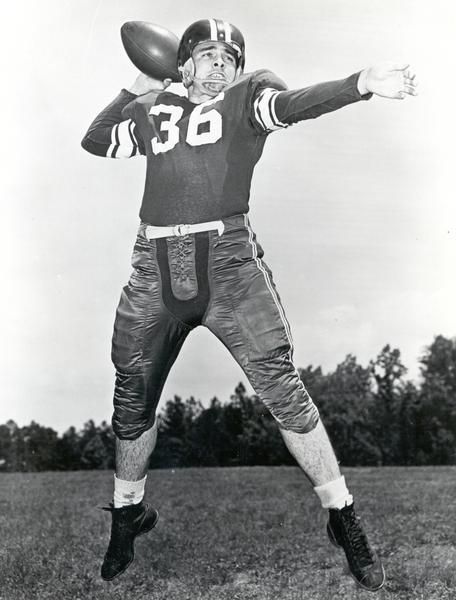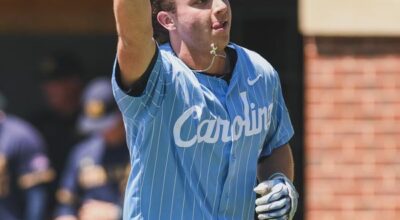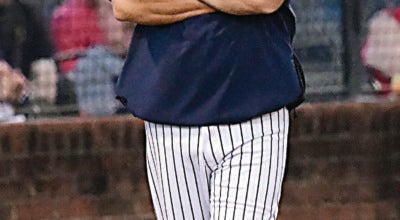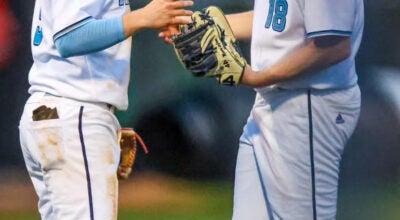Barger: ACC Player of the Year in 1954
Published 12:00 am Friday, May 16, 2014
SALISBURY — Salisbury native Jerry Barger died recently, as he closed in on the 60th anniversary of his great est athletic moments at Duke.
Barger, who passed away at 82, was a decent guy, humble, funny and self-depricating, and I was fortunate enough to speak to him on several occasions.
I asked him to sum up the secret of his success five years ago, and he simply said, “Right place, right time.”
Maybe there was something to that. Barger realized he was fortunate to have two coaches — Boyden’s Bill Ludwig and Duke’s Smilin’ Bill Murray — who believed in the leadership qualities of a 5-10, 170-pound guy who wasn’t a sprinter and didn’t have a great arm.
Barger played in an era of Southern football when the game was much smaller and much slower, but I have no doubt he would’ve been a good player if he’d been born decades later. There’s a YouTube video of Barger directing Duke against Nebraska in the Orange Bowl on New Year’s Day, 1955, and he looks crafty and elusive, even after a couple of knee injuries.
Sonny Jurgensen, who threw 255 touchdown passes in the NFL, was a sophomore at Duke in 1954 and backed up Barger, who was a senior. That’s a pretty good indicator that Barger could play.
“Sonny backing me up was my claim to fame,” Barger told me once with a chuckle in his voice.
Barger started out as a 105-pound center at Boyden. He was too small for the shoulder pads which kept sliding down over his face and obscuring his vision. That’s why Ludwig made him a fullback — a move that turned out pretty well.
In 1949, Barger scored the first touchdown at the place we know now as Ludwig Stadium. That touchdown lifted Boyden to a 6-0 victory over mighty Charlotte Central.
Before his high school days were over, Barger had been switched from fullback to tailback, the key guy in Ludwig’s single-wing offense. He was All-State, All-Southern and All-American. Then he was a standout in the 1950 Shrine Bowl.
Salisbury was a UNC town then, and Barger was light blue as much as anyone. His idol was Charlie “Choo Choo” Justice, who was making a habit of beaging Duke every year.
Barger decided to go to Duke, the Tar Heels’ biggest rival, because Duke had an Air Force ROTC program in which he could enroll. That would postpone his military obligation a few years, and that seemed like a good idea given what was happening in Korea.
Barger liked basketball and had interesting tales of his brief experiences with the Duke basketball team, which included All-American Dick Groat.
“I played in one freshman game,” Barger told me. “That’s when they said it might be best for me to concentrate on football.”
In the fall of 1951, freshmen were eligible for varsity football. Barger was a third-stringer for Murray, a new coach who was installing the Split-T offense.
Duke had two senior quarterbacks and Barger was on the bench. Then one QB hurt his knee. The other hurt his ankle. That made Barger the starter for the opener against South Carolina. Right place, right time.
He threw the first touchdown pass of his life, Duke beat the Gamecocks 34-6, and Barger was named Southern Conference Freshman of the Week.
Duke had a winning season. Barger had a strong year. He directed a victory against UNC, but he had a knee crushed late in that game by a Tar Heel lineman. Barger went straight from the field to the hospital. He rehabbed torn cartilage that offseason by riding a bike.
Barger hurt his other knee as a sophomore in 1952, but he played in every game and Duke won the Southern Conference championship, the last one before that giant league split into several smaller organizations, including one that we’re all familiar with — the Atlantic Coast Conference.
Barger was one of the best all-round players in the ACC in 1953 and 1954 and directed Duke to conference titles both seasons. He played 60 minutes every Saturday and intercepted 13 passes as a safety.
Three of Barger’s interceptions came in one game against UNC. He never minded pointing out that his Duke teams were 4-0 against the Tar Heels.
In his 37 career games, Barger passed for 1.294 yards and nine TDs, rushed for 519 yards and 10 TDs, had 538 yards in kickoff and punt returns and punted 54 times for a 33.2-yard average.
Duke was 28-10-3 in his four seasons and was ranked in the top 20 nationally the last three years.
Barger was first team All-ACC in 1954, Duke’s team MVP and the ACC Player of the Year.
He won national back of the week honors twice, for beating Purdue in 1953 with a scoring run in the final minute, and in 1954 for leading a comeback in which the Blue Devils erased a 20-point deficit in the fourth quarter to beat Georgia Tech.
Barger’s final two college games were Duke’s 34-7 romp against Nebraska in the 1955 Orange Bowl — he threw two TD passes against the Cornhuskers — and the 1955 Senior Bowl, a game in which he intercepted two passes.
The Chicago Bears drafted Barger in the 23rd round, and Bears coach George Halas called Barger and offered the standard rookie contract — $5,400 for 10 games. Barger would’ve taken it, but it was time for his military service. In February, 1955, he was sworn into the Air Force as a second lieutenant.
Some of Barger’s service time was spent at Shaw Air Force Base in South Carolina. He was a player/coach for the base football team. He remembered beating Alabama QB Bart Starr’s Air Force team, among others.
Barger’s last competitive football game was in December, 1956, when Shaw played the U.S. Army team from Fort Jackson. Ludwig traveled to watch that game, which says something about the high regard with which he held Barger.
Barger was a captain when he left the service in 1959. The American Football League was forming and Barger got an offer from the Denver Broncos. But he was a 27-year-old family man by then, and business opportunities made more sense than taking a chance with a new football league.
Barger entered Duke’s Athletics Hall of Fame in 1996, alongside basketball greats Johnny Dawkins and Mike Gminski. He also was part of the Salisbury-Rowan Hall of Fame’s first induction class in 2001.
Barger owned the Corbin Hills Golf Club and always was a friend of Salisbury High athletics.





